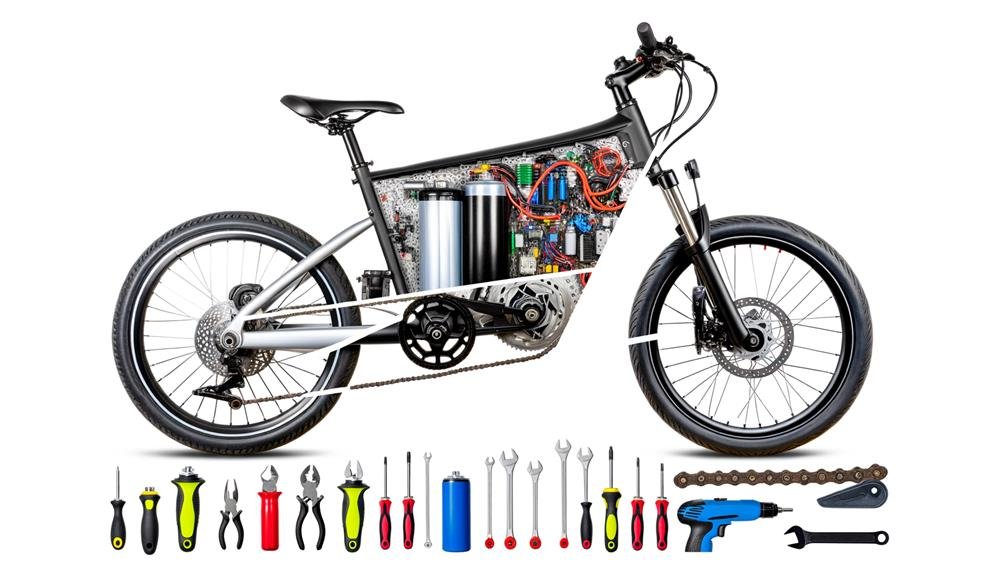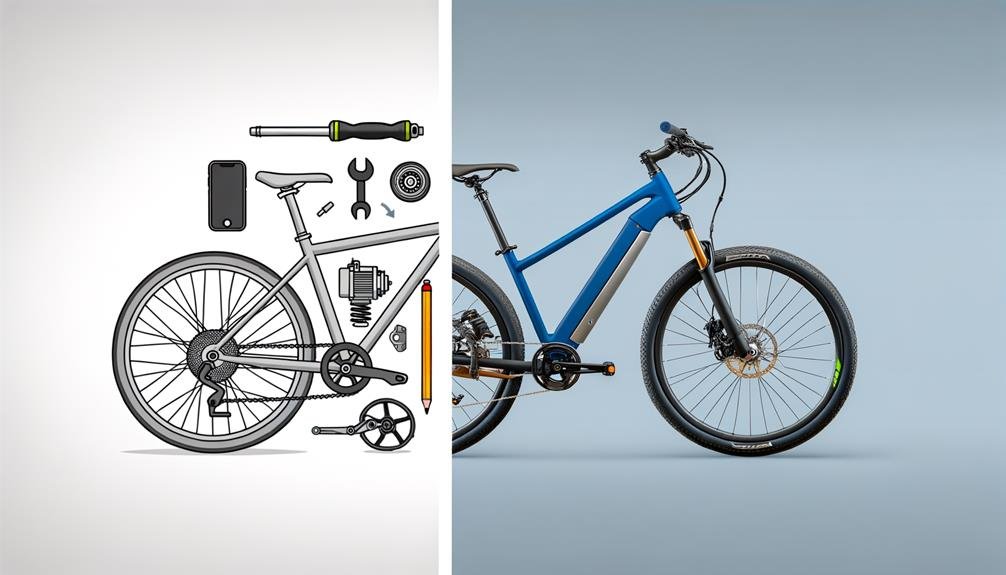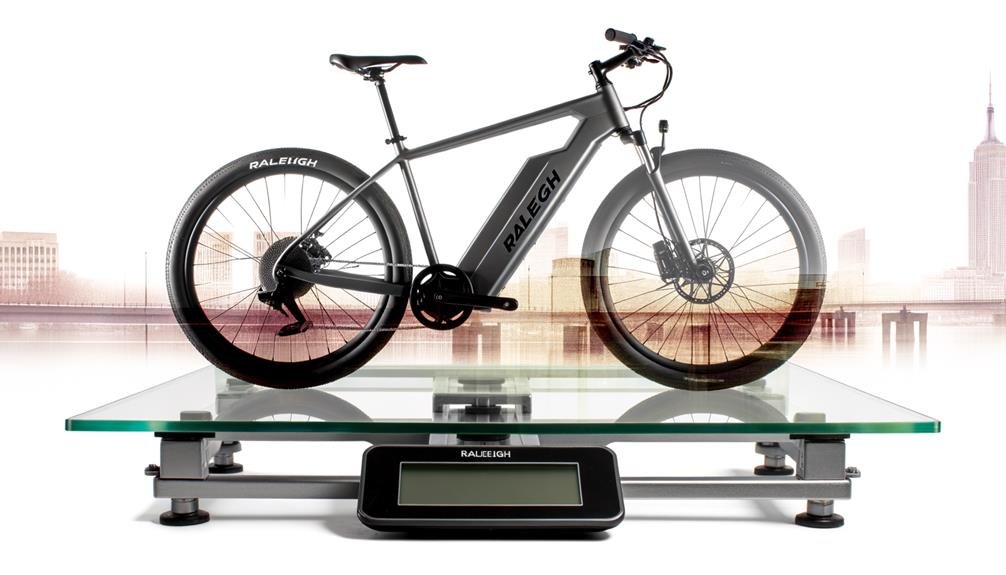Charles Miller is a veteran bike enthusiast with over 12 years of experience dealing with bikes as a mechanic. Despite immense love and expertise for...
Last summer, we took a lengthy trip down the coastline on our newly purchased electric bikes, enjoying the ease of pedaling and the swift, silent glide. Yet, despite the thrill, we couldn't ignore the fact that our adventure was cut short due to the limited battery life.
This experience sparked a curiosity in us. Are electric bikes really the future of personal transportation as many claim, or are they just another tech fad destined to fade away?
As we explore the pros and cons of electric bikes, you'll find there's more to consider than meets the eye.
- Key Takeaways
- Understanding Electric Bikes
- Benefits of E-Bikes
- Potential Drawbacks of Electric Bikes
- Cost Analysis: Electric Vs Traditional Bikes
- E-Bike Maintenance Requirements
- Speed and Performance of E-Bikes
- Legal Considerations for E-Bike Users
- Customization Options for E-Bikes
- Environmental Impact of E-Bikes
- Choosing the Right E-Bike for You
- Frequently Asked Questions
- Conclusion
Key Takeaways
- Electric bikes are eco-friendly and contribute to reducing air pollution.
- They provide a convenient and efficient mode of transportation, especially in heavy traffic.
- Electric bikes offer a customizable exercise option for individuals with health challenges.
- While they may have a higher initial purchase price, the long-term benefits and cost savings outweigh the investment.
Understanding Electric Bikes
When we delve into the realm of electric bikes, we find that they aren't only eco-friendly, reducing air pollution, but they also offer a full-body workout suitable for those with limited physical strength. Understanding electric bikes begins with appreciating their dual functionality. They require pedaling to activate their motor, making them easy to ride with less effort. This feature is particularly beneficial for those who may have limited physical strength but still wish to enjoy the benefits of cycling.
We're not just talking about leisurely rides in the park, though. Electric bicycles can reach speeds of up to 15.5 miles per hour, making them a viable option for faster travel, especially during rush hour. This potential speed combined with the reduced physical effort required can transform your daily commute.
However, as we explore the pros and cons of electric bikes, it's important to note that they require regular charging. The time to fully recharge an electric bike battery ranges from 2.5 to 8 hours. But don't let that deter you. With thoughtful planning, electric bikes can easily cover longer distances, transforming your ride into a seamless blend of convenience and eco-friendliness.
Benefits of E-Bikes
Shifting our focus from the basic understanding, let's now explore the numerous benefits that electric bikes bring to our lives, from economical transportation to improved physical health.
Evaluating the pros and cons of electric bikes reveals that these innovative vehicles can provide significant advantages.
One of the main benefits of e-bikes is their cost-effectiveness when compared to other methods of transportation. They're not only cheaper to buy but also to maintain and operate.
Beyond the economic aspect, electric bikes promote an active lifestyle. They provide a great way to incorporate regular physical activity into our daily routines, thereby improving our overall health.
Moreover, e-bikes offer:
- Customizable exercise suited for individuals facing health challenges, who might find traditional bikes too strenuous.
- Extra time for recreational activities, as commuting becomes less time-consuming and more enjoyable.
- Increased travel distance, thanks to the assistance from the motor, expanding our horizons and reducing our dependency on fossil fuels.
Potential Drawbacks of Electric Bikes

Let's delve into the potential drawbacks of electric bikes, which can range from the significant upfront investment required to the confusion surrounding their legal status and regulations.
The purchase of an electric bike can be a significant financial commitment. Unlike traditional bikes, the cost of an electric bike often falls in the higher price range. This is due to the complex technology and components involved. Thus, the cost factor is one of the main cons of electric bikes.
Also, the added weight of an electric bike could be a downside for some. The battery and motor make these bikes heavier than their non-electric counterparts. This could make them harder to maneuver, particularly for those of us who are less physically strong or accustomed to lighter bicycles.
The confusion over legal status and regulations is another potential drawback of electric bikes. Different regions have different laws and regulations regarding their use, leading to uncertainty for potential users.
Cost Analysis: Electric Vs Traditional Bikes
Let's turn our attention to the financial implications of choosing between an electric bike and a traditional one.
Considering the initial purchase price, we must acknowledge that electric bikes generally command a higher price tag than their traditional counterparts.
However, the maintenance and operating costs over time, as well as the potential resale value, play significant roles in the overall cost analysis.
Initial Purchase Price
Diving into the cost analysis, we find that the initial purchase price of electric bikes is significantly higher than their traditional counterparts. This is one of the significant cons to consider when deciding between a traditional bike and a quality electric one.
- A quality electric bike's initial purchase price starts from around £1,000 and can go as high as £4,000 or more.
- The higher initial purchase price may be a deterrent for some, making traditional bikes a more economical choice upfront.
- However, an electric bike is often viewed as an investment with a high resale value, potentially offsetting the initial cost.
In our exploration of the pros and cons of electric bikes, it's clear that while the initial purchase price is a hurdle, the long-term benefits may outweigh this initial investment.
Maintenance and Operating Costs
Shifting our focus to the realm of maintenance and operating costs, we find that electric bikes, despite their higher upfront costs, tend to be more economical in the long run due to their minimal operational expenses and lower maintenance needs compared to traditional bikes.
The motor and battery of an electric bike are its heart and soul, with maintenance largely revolving around ensuring these components are in top shape. This includes regular cleaning and lubrication, as well as brake pad checks.
While the initial investment is higher, the lower operating costs and reduced need for fuel make electric bikes a more cost-effective option over time.
E-Bike Maintenance Requirements

When it comes to the upkeep of e-bikes, there are five key maintenance requirements that ensure their optimal performance and longevity:
- Regular battery charging is paramount as e-bikes are usually dependent on their batteries for operation. Charging times generally range from 2.5 to 8 hours, depending on the electric bike model.
- Motor and electrical components also need periodic checks. These checks help in identifying any potential issues early on, thereby preventing breakdowns and ensuring smoother rides.
- Brakes and tires are critical safety components that need regular inspection. Worn-out brakes or tires can severely undermine the safety of your ride.
- Like any other bike, an electric bike also needs routine cleaning and lubrication. This prevents wear and tear and maintains the bike's functionality.
- Certain components such as the motor and electrical system may require professional servicing. This ensures that these complex parts are functioning correctly and are in optimal shape.
Maintenance requirements might seem daunting, but regular upkeep ensures your e-bike serves you well for a long time, offering a smooth, safe, and efficient ride.
Speed and Performance of E-Bikes
Let's now turn our attention to the speed and performance of e-bikes.
With their ability to reach speeds up to 15.5 mph, they often outpace cars in heavy traffic and can cover longer distances with help from the motor.
Not only do they offer a more comfortable ride with less effort, they excel in tackling challenging terrains such as hills and mountains.
E-Bike Top Speed
In the bustling rush hour, an E-Bike, capable of hitting speeds up to 15.5 miles per hour, often proves quicker than a car stuck in traffic. Riding an electric bike allows for efficient and fast travel, especially in congested areas. The maximum speed of an electric bike depends on various factors. Let's scrutinize the e-bike top speed:
- E-Bikes provide a boost to your pedaling efforts, enabling higher speeds and covering longer distances in a shorter span.
- The top speed can be adjusted based upon the rider's preference for a more personalized riding experience.
- For safety and legal compliance, the speed of an E-Bike can be limited.
With these insights, we can understand how e-bikes offer a promising and efficient alternative for urban commuting.
Performance Analysis
Analyzing the performance of electric bikes, we find a remarkable increase in speed with less effort, enabling riders to traverse longer distances swiftly and efficiently. It's a notable pro in our performance analysis. Moreover, tackling challenging terrains and steep hills becomes a breeze with electric assistance.
| Aspect | Pros | Cons |
|---|---|---|
| Speed | Faster with less effort | – |
| Terrain Adaptability | Easier on challenging terrains | – |
| Customization | Adjustable assistance levels | – |
| User-Friendly | Suitable for all skill levels | – |
| Weight | Technological advancements reducing weight | Some may still find them bulky |
However, the cons are not to be overlooked. Despite advancements, some riders may still find the electric bike's weight due to the motor and battery a tad bulky. Yet, we believe the pros outweigh the cons.
Legal Considerations for E-Bike Users

Navigating the legal landscape for e-bike users can be tricky, as it varies significantly from country to country and even within regions. As we delve deeper into the world of electric biking, it's crucial to be aware of the legal considerations for e-bike users.
In most places, you don't need a license to ride an e-bike, but you're still expected to adhere to motor laws. Typically, an electric bike doesn't require road tax, MOT, or insurance. However, more powerful models might've additional legal obligations, which is something to keep in mind before you hop on and ride an ebike.
Here are a few points to remember:
- Electric bike laws can vary drastically across different countries and regions.
- Some places have restrictions on where you can use your e-bike.
- The speed and power of your electric bike should align with legal requirements.
Understanding these aspects ensures we aren't just enjoying the convenience and benefits of e-bikes, but also being responsible riders. Always be aware of the legal landscape of your area, and make sure your journey in the world of electric is smooth and hassle-free.
Customization Options for E-Bikes
Diving into the sea of customization options for e-bikes, we find a plethora of choices that can truly make your electric bike a reflection of your personality, style, and riding needs. Compared to traditional bikes, the electric motor of e-bikes opens up a new dimension for personalization.
| Customization Options | Benefits | Best For |
|---|---|---|
| Frame & Design | Unique look, personal style | Trendsetters, style-conscious riders |
| Motor & Battery | Enhanced speed, power, range | Long-distance riders, speed enthusiasts |
| Accessories | Improved functionality, utility | Commuters, practical riders |
| Control Systems | Personalized experience, ease of use | Tech-savvy, convenience seekers |
The frame design can be customized to suit your aesthetic preferences, while motor and battery upgrades can boost your bike's performance to meet your riding needs. Accessories add functionality and utility, whether that's a stylish mirror or a practical rack for your commute. Adjusting the control systems allows you to tailor the bike's operation to your preferences.
Environmental Impact of E-Bikes

Turning our attention from the personalization of e-bikes, let's consider their environmental impact, a facet that's as critical as it's commendable. When we compare an electric bike to a conventional bike, the former certainly has a higher upfront environmental cost due to the production of its battery. However, once on the road, e-bikes offer significant environmental benefits.
- They contribute to reducing air pollution by not producing harmful emissions.
- They consume 40 times less energy than gas-powered cars, advocating for energy conservation.
- They reduce our carbon footprint, thus aiding in tackling the climate crisis.
Riding an e-bike isn't just about the thrill and ease of cycling, it's also about embracing a lifestyle that aligns with environmental sustainability. It's a mode of transportation that reduces our reliance on cars, promoting eco-friendly commuting. E-bikes are an excellent alternative to cars, offering a low-impact, energy-efficient, and eco-friendly transportation option.
Choosing the Right E-Bike for You
Navigating the realm of e-bikes can be complex, but we're here to help simplify the process.
It's crucial to understand the features of e-bikes, compare different models, and grasp some maintenance tips to make an informed choice.
Let's discuss these points to help you select an e-bike that not only fits your lifestyle but also delivers on performance and convenience.
Understanding E-Bike Features
When choosing the right electric bike for you, it's essential to understand the distinct features of e-bikes and how they can enhance your cycling experience. Understanding e-bike features goes beyond just knowing the brand or model; it's about knowing what your ebike requires and what level of assistance it provides.
- Range and Distance: E-bikes can cover long distances, offering a range comparable to traditional bikes.
- Climbing Ease: E-bikes make uphill rides and uneven terrains easier to conquer.
- Customization: The level of customization is similar to non-electric bikes, catering to individual preferences.
Comparing Different E-Bikes
Diving into the world of e-bikes, it's clear that selecting the right one hinges on a careful comparison of their features, costs, and maintenance requirements, all while keeping in mind the unique needs and preferences of the rider.
When comparing different e-bikes, we must consider factors like the ability to ride without exerting excessive effort, the pros and cons of each model, and their eco-friendly nature. Some e-bikes allow customization to suit your style, but remember, an electric bike typically costs more upfront than regular bikes, although they require minimal maintenance.
Also, while you don't need a license to ride, obeying motor laws is essential.
E-Bike Maintenance Tips
After carefully considering various e-bike models and their unique features, it's crucial we shift our focus to the maintenance aspect as it plays a significant role in choosing the right e-bike for you. Regular upkeep of your electric bike not only extends its lifespan but also ensures a smooth, safe ride each time. Bikes can help us stay fit, commute conveniently, and reduce our carbon footprint, but they also need our care.
To keep your e-bike in top-notch condition, consider these e-bike maintenance tips:
- Regularly check and maintain the battery, the heart of your e-bike.
- Keep the motor clean and well-lubricated for smooth operation.
- Don't neglect your brakes; inspect and adjust them regularly for safety.
Frequently Asked Questions
What Are the Disadvantages of Electric Bicycle?
We've noticed electric bikes have drawbacks. The purchase cost is high, battery lifespan is limited, charging infrastructure is lacking, and they present maintenance issues. They're also heavier, which can affect handling and portability.
What Is the Common Problem of E-Bike?
We're often battling battery lifespan, charging issues, technical failures, and high maintenance costs. These common problems can make e-bike ownership seem daunting, but there's a sense of community in overcoming these challenges together.
Is It Worth It to Have an Electric Bike?
We believe it's worthwhile to have an electric bike. Considering their affordability, environmental impact, and fitness benefits, they're a great choice. However, one must consider the battery lifespan and ongoing maintenance costs.
Are Electric Bikes Good for Long Rides?
We've found that electric bikes are great for long rides. Like a loyal companion, the pedal assistance boosts ride comfortability. However, battery life can be a concern, so map out charging stations beforehand.
Conclusion
So, folks, there you have it! E-bikes are as exhilarating as a lunar landing, but with a few hitches.
Sure, they're a bit pricey and maybe not ideal for every terrain or marathon ride. And don't get us started on their weight!
But with their enviable perks and environmental friendliness, they're a game-changer. A bit of maintenance, some legal know-how, and the right customization, and you're on your way to a spectacular, electrifying riding experience!

Charles Miller is a veteran bike enthusiast with over 12 years of experience dealing with bikes as a mechanic. Despite immense love and expertise for his Tacoma, he rides his Trek Ebike more. Anytime you meet him, you’ll either hear him talking about Bikes, or writing about all things bikes and cars on this blog.
More Posts


